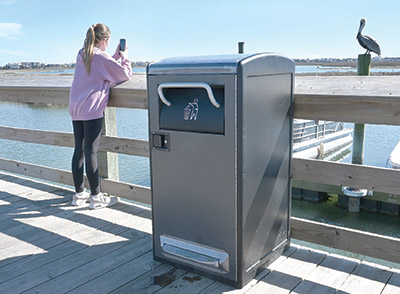Pawleys Island
Town considers solar-power compactors for beach accesses

Two things that Pawleys Island has in abundance during the summer: sunshine and trash. The town is looking at a way to harness the former to help reduce the latter.
Administrator Dan Newquist proposed to Town Council last week that they install solar powered compacting trash bins at beach accesses.
“It’s a good strategy for a community like ours,” he said.
Newquist is working up a proposal after talking with Bigbelly, a Massachusetts-based company that produces the bins. Four were installed last year on the Murrells Inlet Marshwalk.
“They’re really good at keeping things contained,” said Beth Goodale, the director of Georgetown County Parks and Recreation, which partnered with Murrells Inlet 2020 to install the compactors along the Marshwalk.
The goal there was to keep trash from blowing into the creek. The bins had the additional benefit of reducing pickups by county crews.
The county picked up 2,000 pounds of trash a day from beach accesses at Garden City and from the Marshwalk last summer, Goodale said.
Collecting trash is also an issue for the town. “I think you guys would be surprised,” Police Chief Mike Fanning told Town Council.
Last summer, there was a problem with trash overflowing from bins on the island’s south end, Mayor Brian Henry said.
The compactors would prevent that. “These are sealed containers,” he said.
Henry also suggested that the compactors could provide an opportunity to get beachgoers to start recycling. The town’s household recycling program is on hold because the principal trash hauler can’t separate the material before it gets to the county landfill. The town wants to revive that program.
The town could designate some solar compactors for recycling, Newquist said.
The bins cost $4,000 each.
“They also have a leasing option,” Newquist said.
That’s the option he is leaning toward, at least at the start. He said it will be important to ensure that the bins can stand up to the salt air. Also, the bins will need to be moved in advance of major storms, he added.




